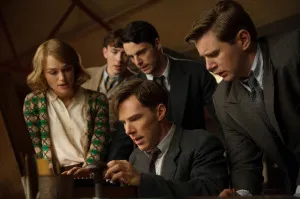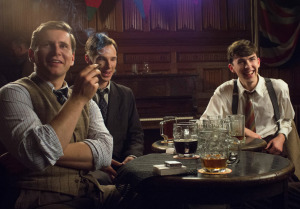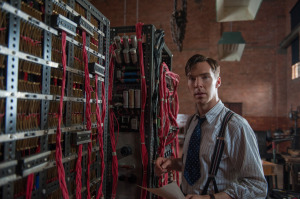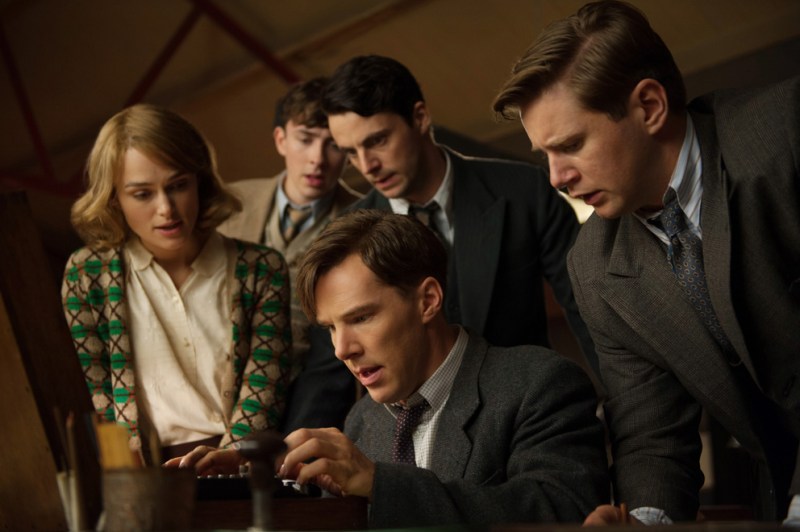
Starring Benedict Cumberbatch, of “Sherlock” fame, and Academy Award nominee Keira Knightley, Morten Tyldum’s “The Imitation Game” weaves the tale of the brilliant and short-lived father of computer science, Alan Turing. Told in three intersecting time periods, the film explores Turing’s governmental persecution at the hands of a post-war criminal “indecency” trial for homosexual behavior, his first encounter with love as a young boy, and, most prominently, his brilliance in cracking the Enigma, the unbreakable German code so central to the allied victory in WWII.
Written by first-time screenwriter Graham Moore, the film considers the nature of love, the absurdity of hate, and, through a dissection of Turing himself, what truly constitutes a hero. Winner of the People’s Choice Award at the Toronto International Film Festival, “The Imitation Game” has emerged as a major awards contender and appears to be primed for Oscar glory. The Stanford Daily sat down with Graham Moore and actor Allen Leech, most known for his work on “Downton Abbey,” who plays a member of Turing’s code-cracking team at Bletchley Park. We discussed everything from their attraction to the project to the importance of scientific accuracy in STEM films.
The Stanford Daily (TSD): What it is about Alan Turing that attracted you to him as character? Were you drawn to his personality, his accomplishments, his role in the development of the field of computer science or his role as this viciously persecuted enigmatic unsung hero? The man is just so multi-faceted.
Graham Moore (GM): Certainly, all of those things. Alan Turing, to me, always felt like an outsider’s outsider. He was a man who was so isolated from the world around him for so many reasons: because he was a gay man at the time, and that was literally illegal; because he was the smartest person in every single room in which he entered; and he was an outsider because he was keeping secrets for the government, which he couldn’t tell anyone else about. And I loved this idea of a character who thought differently than anyone else. Someone who was forced to the outside of the society around him but was able to accomplish things that no one thought possible — not in spite of his differences but precisely because of that. That was tremendously compelling to me.

TSD: I would be interested to hear how you went about finding Turing’s voice — considering he was never recorded in video or audio. Was his voice based on secondary accounts? To what extent was it influenced by your personal vision of the character?
GM: As you said, we have no audio recordings of Alan Turing. We have no video of Alan Turing. We have recollections from people who knew him that have been written down, that have sort of been recorded over the years. We have the memories of people who were at Bletchley Park.
One of the great experiences, as were making the film, was getting to meet members of his family. Benedict [Cumberbatch] met with some of the people in his family who were able to talk, before the film, about how he moved, how he talked, how he walked. Benedict met with one of his secretaries who had been with him his whole life who could talk about his movement and his voice and all that. But yeah, the process of finding Turing’s voice was hopefully highly educated guess work. We were getting as many sources as possible, getting as many data points as possible, then interpolating between them what he was really like.
He had this stammer, which was sort of another thing that separated him from people. Difficulty in communication was something that we were sort of fascinated by. And it’s a movie about codes. It’s a movie about puzzles, and it’s a movie about — in some ways — what communication was everyone going to understand, and what communication was floating below the surface. And the Turing character was sort of someone who[se] difficulty in communication this theme running throughout the film.
TSD: [to Allen] “The Imitation Game” is first and foremost a biopic. At the same time, however, it has a group mentality to its narrative. The members of Turing’s team are frequently as important to the film as Turing himself, and I feel that, oftentimes, it’s easy to lose track of a character in an ensemble narrative. I was wondering if you could perhaps describe how you went about making your character, John Cairncross, distinct and idiosyncratic within the group at large.
Allen Leech (AL): Yeah, I think it’s a very good point. A lot of times the ensemble becomes very important, but the ensemble [here] partly symbolizes the isolation that Turing felt. In relation to creating John, and creating characters, there is a great responsibility when you play someone who actually existed. Research is very important, and what that research does, especially when you’re in an ensemble, is to prevent you from losing your way. You know exactly who you are and what you’re portraying within the movie — what your character was trying to achieve.
John Cairncross had a very strong idea of how he was going to help the war effort and people thought that was absolutely insane, but he genuinely thought that, by helping the Soviets, he could end the war quicker. And so when you have a character with such a strong idea, a notion, of what he was hoping to achieve within the movie it helps to stop you from feeling that you’re losing your way, as a character.
All of these people who actually existed deserve their own movies, because their stories are so fascinating. It’s definitely a situation where truth is stranger than fiction. But obviously, the movie is about one man and his struggles and the people he encounters along that way.
TSD: [to Graham] Oftentimes, critics will call attention to these minute factual errors in STEM-heavy films and then blow those errors out of proportion. As a screenwriter, how concerned are you with realism in regard to STEM topics? How much do you actually need to know, and how do you go about marrying that knowledge with viewer accessibility?
GM: I think what was important to all of us when making this film was making a film that respected its audience in terms of intelligence. We did not want to condescend to our audience. One of my big pet peeves in films about science and technology — and films about scientists — is there is always some moment where there’s like a scientist character [who] will say something technical, and the guy to his left is like, “whoa Bill, say that again in English! Like, no one could possibly understand what you just said!” No! If you’re going to make a film, and you’re going to have dialogue, and you want to take the characters seriously, let’s understand what they’re saying. If there is going to be technical dialogue, let’s render it in a way that the audience can understand it and expect that it’s not going to be so far over their heads. So what we tried to do, at every stage, was get the vague concept across, the big theoretical ideas going on, and explain those and expect the audience to follow along.

TSD: In post-Tony Stark America the concept of an abrasive genius has taken a real nose dive into the cliché, and I’m curious how you overcame that archetype and how you made Turing into something more complex, someone who’s not just [smart and] hard to get along with. Could you talk about making him [real] and not just a cliché?
AL: Well the first thing you did, in the first re-write, is you got rid of the suit.
GM: Yeah. Enormous. When we took him out of that Iron Man suit, there was this part where he was sort of flying around.
AL: [Laughs]
TSD: The most important part.
GM: Yeah, that was a weird draft, not going to lie. A lot of interesting artistic decisions made. [Laughs] No, the trick to Turing, I think, for all of us, was there was such a fragility to him at his core. He’s someone who had a very rough childhood. He grew up with foster parents the first [few] years of his life. He had these horrible experiences at boarding school when he was a teenager. He was so isolated from everyone around him. He wasn’t flashy. He wasn’t showy. He is never purposefully rude to anyone in the film. We talked about that a lot. In the lunch scene, for example, when you guys were going through that, we talked about this a lot. Turing was never trying to be rude. He just ends up accidentally being rude because his mind is somewhere else. He’s always thinkin—
AL: He’s so far ahead. He’s like, “this is just information I don’t need right now. I’m trying to create a machine that’s going to break the unbreakable code, and you’re asking what? You’re telling me you’re going to lunch? I don’t really care. Yes, I can hear you.” And he just takes this information, and he doesn’t feel that he has to respond. But it’s also that thing that, he’s not being ignorant, he’s just not engaging, because he doesn’t feel that he has to.
TSD: Allen, you’ve done a lot of work in period acting but, at the same time, you’ve done a great deal of contemporary acting, as well. And I was curious how that differs for you. What’s it like working within that structure of a period piece?
AL: I always find that the challenge is [the] constraints of society in that time. That’s kind of where you have to begin any journey with a character. And I love seeing how society has changed and adapted. And I think, with this movie, what I am most kind of proud of is the fact that people will come out of this movie — and young people especially — and they will be absolutely, positively, puzzled as to why someone was persecuted because of their sexuality. Though it was not that long ago. We’re talking less than 70 years, 60 years,that this man was convicted of “crimes” just because of who he chose to love.
And I love the fact that you can go back and into a time period and the restraints of everything from dialogue, to comportment, to what society allowed you to do. It’s a bit like Alan Turing. You know you can only be as human as you convince someone else that you are. And society is where you can only go as far as society will allow you to. Unfortunately for Alan Turing, his life was cut short because of the limitations of how people viewed people.
“The Imitation Game,” opened in wide release over the Thanksgiving holiday, and will open in the Bay Area on December 12.
Contact William Ferrer at wferrer ‘at’ stanford.edu.
